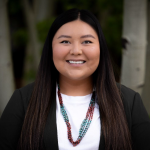
AI Director, Federal Civilian, Microsoft
Dr. Nelli Babayan is the AI Director at Microsoft, overseeing AI initiatives with all U.S. Federal Civilian agencies. She leads virtual cross-solution teams to advance mission outcomes, directing strategy and secure implementation of AI by fostering collaboration and developing mission-specific use-cases. She has delivered numerous talks and moderated panels at both US events such as GOVAI Summit most recently and international conferences, including in Canada, Italy, Germany, UK, France and other countries. Nelli supports AI efforts with her extensive and diverse background, having managed research and policy projects at DC-based think-tanks, lectured at universities, published in peer-reviewed journals, and led international projects.

Consultant
Carrie L. Billy is an enrolled member of the Navajo Nation. She is an activist, innovator, coalition builder, and committed advocate for her people and homeland. She has a record of success in both the government and nonprofit sectors, where Carrie’s accomplishments include designing strategic initiatives, developing groundbreaking policies and programs, and forging meaningful partnerships. For more than 25 years, Carrie worked with the nation’s Tribal Colleges and Universities (TCUs), including serving for 15 years as the president and CEO of the American Indian Higher Education Consortium. Before joining AIHEC, Carrie worked in private law practice and the U.S. Senate. Former President William J. Clinton appointed her as the inaugural Executive Director of the White House Initiative on Tribal Colleges.
Throughout her career, Carrie has focused on building equity-centered initiatives founded on Native cultures and values, including the Indigenous Evaluation Framework, which brings Indigenous epistemology and core tribal values into a framework that integrates place, community, individuality, and sovereignty with Western evaluation practice. While at AIHEC and in the Administration, Carrie secured billions in funding for TCUs, including establishing new federal programs for TCUs at the National Science Foundation (NSF), NASA, and the Departments of Education, Agriculture, Energy, Housing and Urban Development, and Health and Human Services. Carrie has served on numerous national and international boards, including the American Council on Education, the American Association of Community Colleges, the U.S. Department of Homeland Security Academic Advisory Council, the World Indigenous Nations Higher Education Consortium (WINHEC) Governing Board, and the Sustainable Development USA Leadership Council. Carrie has undergraduate degrees from the University of Arizona and Salish Kootenai College and a Juris Doctorate from Georgetown University Law Center.
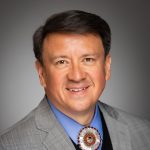
General Counsel and Chief of Staff, NCAI
Geoffrey Blackwell is General Counsel and Chief of Staff for the National Congress of American Indians. Blackwell brings a wealth of knowledge and experience to NCAI, following eight years of service as the chief strategy officer and general counsel for AMERIND. Blackwell was the founding chief of the Federal Communications Commission’s (FCC) Office of Native Affairs and Policy, where he spearheaded efforts to bring modern communication technologies to tribal communities nationwide. In 2000, he also made history as the first enrolled member of a federally recognized Tribal Nation to work at the FCC. Blackwell has played a pivotal role in advocating for broadband policy on behalf of Tribal Nations. He has testified before Congress on seven occasions, and before the U.S. Commission on Civil Rights. In 2020, was honored as a co-recipient of Public Knowledge’s IP3 Internet Protocol Award.
In addition to his role as general counsel and chief of staff, Blackwell maintains active engagement in various national organizations. He serves on the boards of the Native American Rights Fund and the American Indian Policy Institute at Arizona State University. He has also dedicated his efforts to assisting Tribal Nations through involvement with the National Small Business Association, National Federation of Community Broadcasters, Native Public Media, Acoma Business Enterprises, and the Indigenous Commission for Communications Technologies in the Americas. Additionally, within NCAI, he assumes leadership responsibilities as co-chair of both the Economic, Finance, and Community Development Committee and the Technology and Telecommunications Subcommittee.
Raised in Oklahoma and New Mexico, Blackwell is Chickasaw, Choctaw, Omaha, and Muscogee Creek. He comes from a family deeply involved in tribal leadership and federal service dedicated to Indian Country. He is a graduate of Dartmouth College and the University of Virginia School of Law.

Executive Director, National Indian Court Judges Association
Nikki holds a JD degree and a Certificate in Indian Law from Arizona State University College of Law. Nikki also holds a B.A. and M.A. in Cultural and Social Anthropology from Stanford University where she graduated with honors. As an Attorney, Nikki has worked with all aspects of Indian law as well as civil litigation. Nikki’s current work entails strengthening and enhancing tribal judicial systems, including developing training and technical assistance for tribal judicial personnel, attorneys, and other organizations.
Ms. Campbell also serves on the Board of Directors for the Partnership for Native Children (PNC), a non-profit started by a group of motivated women from across Indian Country who were increasingly concerned with the intense media coverage of the Indian Child Welfare Act (ICWA) and accompanying legal cases. She has also served on the Arizona State University Indian Legal Program Advisory Council since September 2018.
Ms. Campbell is married to Matthew Campbell (Y’upik) who is a staff attorney at the Native American Rights Fund, and she is the mother to Eli and Eloise.

Associate Dean for Applied Research and Partnerships, Professor of Law, ASU Law
Diana M. Bowman is a full professor in the Sandra Day O’Connor College of Law, where she serves as the associate dean for international engagement, and the School for the Future of Innovation in Society. She is also a PluS Alliance Fellow (2016-2019) and team member of PlanetWorks in the Julie Ann Wrigley Global Institute of Sustainability.
Her research analyzes and informs the development of smarter governance and regulation of innovation in order to simultaneously enhance creativity, improve public health, and stimulate deliberation of the ethical, legal, and societal dimensions of emerging technologies.
Diana is an Andrew Carnegie Fellow (Class of 2018).
Data Analyst, Gila River Indian Community
Leonard Bruce is a data analyst and policy strategist from the Gila River Indian Community, where he focuses on leveraging data to support tribal governance, education, and economic resilience. A graduate of Arizona State University with a Master’s in Science & Technology Policy, Leonard brings deep expertise in Indigenous labor, decolonizing employment systems, and the ethical use of tribal data. Through his work with Tribal DataWorks and his writing on Stories & Systems, Leonard explores how data sovereignty and storytelling can empower Native nations in the digital age.
Interim CEO and CAO, Morongo Band of Mission Indians
As Chief Administrative Officer for our tribe, I bring over 16 years of dedicated service and a lifelong connection to our community. Born and raised on the reservation, my journey reflects the impact of our tribal programs, from my tenure as Fire Chief to my leadership in operational management, budgeting, strategic negotiations, and business innovation. Guided by a commitment to accountability, transparency, and economic growth, I work to ensure the long-term prosperity of our people while continuing to expand opportunities for future generations.
Executive Director, National Inter-Tribal Energy Council
Chris, a member of the Navajo Nation, is the owner of Deschene, PLLC, a tribal energy and legal firm out of Washington, D.C. He is also a co-founder and the current Executive Director for the National Inter-Tribal Energy Council, a national intertribal energy trade association. In 2017, Chris completed a distinguished term as the Director of the Office of Indian Energy within the U.S. Department of Energy. His responsibilities included working with tribal communities in Alaska and the Lower 48. Prior to serving in D.C., Chris served as general counsel and advisor to tribes and non-Indian business entities working to partner with Indian Country. In 2010, as a former member of the Arizona House of Representatives, Chris gained extensive government and legislative experience in helping tribes maximize their government affairs approaches, building their energy strategies, and strengthening their non-tribal political relationships. Finally, during the 1990’s, Chris served honorably with the U.S. Marine Corps, by completing two tours in the Persian Gulf as an infantry and reconnaissance officer. He holds the rank of Major, U.S.M.C.R. and is a 1993 graduate of the United States Naval Academy and a 2005 graduate of ASU’s Indian Legal Program.

Assistant Dean + Librarian, Law Library, ASU Law
Beth DiFelice is Assistant Dean, Director of the Law Library, and Professor of Practice at the Sandra Day O’Connor College of Law at Arizona State University. She teaches Advanced Legal Research, Indian Legal Research, and International Legal Research, equipping students with the skills to navigate complex legal systems and tribal law frameworks. Beth earned her B.A. from Centenary College and both her J.D. and M.L.S. from the University of Washington. Her career spans law librarianship, legal practice, and national leadership in legal research education, with a deep commitment to supporting Indigenous legal scholarship and access to justice.

Associate Vice President, ASU Knowledge Enterprise
Sean Dudley leads the Research Technology Office, which provides specialized technology solutions and services that enable and protect ASU’s research community and sponsored projects. The office also organizes collaborative projects across the three state universities and supports the advancement of Arizona’s technological infrastructure.
Dudley began his career in research information technology in 1998 at the University of Wisconsin. His passion for blending scientific research and technology later brought him to Tempe, where he initially worked at the ASU Biodesign Institute in the Center for Evolutionary Functional Genomics. Soon after, he advanced to a leadership role among the Knowledge Enterprise that allowed him to develop and provide many services to ASU’s entire research community.
Dudley holds degrees in biology, computer science, and philosophy from the University of Wisconsin. He earned a Six Sigma Black Belt from ASU’s Ira A. Fulton Schools of Engineering and is currently pursuing a PhD at the School for the Future of Innovation in Society.
Senior Research & Policy Analyst, ASU Law
Morgan Gray (Chickasaw Nation) serves as the Senior Research & Policy Analyst at the American Indian Policy Institute, where she leads AIPI’s policy and research agenda. As an attorney and former Tribal government employee, she is deeply committed to advancing research on emerging issues at the intersection of law and policy that impact Tribal communities.
Morgan brings a strong passion for telecommunications and broadband policy to her role. She previously served the Chickasaw Nation and its telecommunications subsidiary Trace Fiber Networks, LLC as a policy analyst tasked with developing and articulating the organization’s broadband development strategy. She also worked to secure federal funding for broadband infrastructure projects in Chickasaw territory, crafted a digital equity plan, and managed the Chickasaw Nation’s wireless spectrum portfolio.
Morgan served as a legal fellow for the U.S. Senate Committee on Indian Affairs while in law school, where she drafted legislation and analyzed policy proposals affecting Tribal communities. She was also a member of the Federal Communications Law Journal’s (FCLJ) editorial board, and prepared law review articles and student-authored notes for publication. After law school, Morgan clerked for the Chief Justice of the Alaska Supreme Court, Susan M. Carney, in Fairbanks, Alaska. Morgan is a proud alumni of the American Indian Law Center’s Pre-Law Summer Institute (PLSI) Program, Class of 2021.
Morgan earned her Juris Doctor from George Washington University Law School in Washington, DC. She also received a Master of Public Administration and Bachelor of Arts in Political Science from Texas A&M University.

Harry Burns Hutchins Collegiate Professor of Law, Co-director, Program in Race, Law, and History, UMLS
Matthew L.M. Fletcher is the Harry Burns Hutchins Collegiate Professor of Law at the University of Michigan and a leading authority on federal Indian law and tribal law. A citizen of the Grand Traverse Band of Ottawa and Chippewa Indians, he serves on the judiciaries of numerous tribal nations and was lead reporter for the Restatement of the Law of American Indians. His work has been cited by the U.S. Supreme Court and he edits the influential blog Turtle Talk.

Associate Dean of Academic Affairs, Distinguished Endowed Professorship in Legal Method, ASU Law
A professor at the College of Law since 2001, Tamara Herrera teaches a variety of courses, including Legal Writing and Method, Legal Advocacy, Writing for Law Practice, Indian Legal Research, and first-year Property. Her scholarly interests include legislative drafting and tribal law, as well as legal writing pedagogy.
Professor Herrera is a member of the Association of Legal Writing Directors and the Legal Writing Institute. From 2016-2020, she served as the Secretary of the Association of Legal Writing Directors. She is a past chair of the Environmental and Natural Resources Section of the Maricopa County Bar and a member of the State Bar of Arizona, the Federal District Court for the District of Arizona, and the United States Supreme Court. She writes a monthly column about legal writing for the Maricopa County Bar’s publication, Maricopa Lawyer. Following her graduation with distinction from the University of Nebraska School of Law, Professor Herrera practiced law at the firm of Ryley, Carlock & Applewhite in Phoenix. She performed complex legal research in water and Indian law; drafted proposed rules and legislation relating to natural resources issues in Arizona; and represented clients in both state and federal courts.
In addition to her law degree, Professor Herrera has a Masters Degree in Information and Library Science from the University of Arizona.
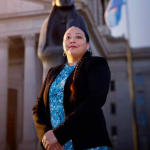
Director of Data Stewardship at the Chickasaw Nation
Mari Hulbutta serves as the Chickasaw Nation’s inaugural Director of Data Stewardship. She earned her Juris Doctor degree from Columbia Law School and her Bachelor of Arts degree from Columbia University. Mari is a proud citizen of the Chickasaw Nation and a descendant of the Seminole and Muscogee (Creek) Nations of Oklahoma.
Special Counsel, Jenner & Block
Krystalyn Kinsel uses her extensive background in complex litigation and Native American affairs to represent and advise tribal governments and multinational technology companies in a variety of litigation and regulatory matters, including environmental and natural resources, telecommunications, economic development, gaming, investigations and intellectual property, among other things. Krystalyn is also a citizen of the Navajo Nation and serves as a Special Prosecutor for a tribal nation.
As a former trial lawyer in the highly prestigious Attorney General Honors Program of the United States Department of Justice in Washington, DC, Krystalyn possesses a rare government’s-eye perspective in trial strategy and plays a key role in managing and overseeing all aspects of litigation, at the trial and appellate level. While at DOJ, the Attorney General acknowledged her remarkable achievements by awarding her the Outstanding Performance Rating Award.
Krystalyn’s vast knowledge of Native American law and policy stems from being a former legislative associate and National Coordinator of Native Vote for the National Congress of American Indians. She also served as a legal extern for the Honorable Susan R. Bolton in the US District Court for the District of Arizona and DOJ’s Office of Tribal Justice. Krystalyn practiced as a student lawyer in the Ak-Chin Indian Tribal Court and the Gila River Indian Community Court.

Dean, ASU Law
Leeds is the Dean of the Sandra Day O’Connor College of Law. Previously she served as Foundation Professor of Law and Leadership at the ASU Law. She is a scholar of Indigenous law and policy and an experienced leader in law, higher education, economic development and conflict resolution. She holds law degrees from University of Wisconsin (LL.M.) and University of Tulsa (J.D.), a business degree from University of Tennessee (M.B.A)., and an undergraduate degree in history from Washington University in St. Louis (B.A.).
Leeds was the first Indigenous woman to serve as a law school dean. She served as dean of University of Arkansas School of Law (2011-2018) and as the inaugural Vice Chancellor for Economic Development, University of Arkansas (2017-2020). She has been a professor and administrator at University of Kansas and University of North Dakota, and a William H. Hastie Fellow at University of Wisconsin. She is an elected member of the American Law Institute and a recipient of the American Bar Association’s Spirit of Excellence Award.
Leeds prioritizes public service at the national and local level. She is a former Cherokee Nation Supreme Court Justice and former Chair of the Cherokee Nation Gaming Commission. She currently serves as a founding board member and treasurer of the Foundation for America’s Public Lands, a congressionally-chartered non-profit. She is a corporate board member for Kituwah LLC (wholly owned business diversification company of the Eastern Band of Cherokee Indians) and board vice-president of Native Forward Scholars Fund (formerly American Indian Graduate Center).
Leeds is passionate about food, agriculture and wellness. She co-founded the Indigenous Food and Agriculture Initiative and now serves as board president of Akiptan (a Native CDFI providing capital to farmers and ranchers) and vice-chair of the board of trustee for the Native American Agriculture Fund (a private, charitable trust serving Native farmers and ranchers created from the historic Keepseagle v. Vilsack settlement).

Governor, Gila River Indian Community
Stephen Roe Lewis was raised in Sacaton, “Gu-u-Ki”, on the Gila River Indian Community. His father is the late Rodney Lewis and mother Willardene Lewis. Mr. Lewis has a son, Daniel currently attending Arizona State University.
Mr. Lewis is in his fourth term serving as Governor of the Community, having previously served as Lt. Governor. Prior to serving in elected leadership, Governor Lewis served the Community as a member of the Board of Directors for the Gila River Healthcare Corporation, as a Gaming Commissioner for the Gila River Gaming Commission, and as a member of the Board of Directors for the Gila River Telecommunications, Inc..
Stephen Roe Lewis graduated from Arizona State University with a Bachelor’s of Science and pursued graduate studies at John F. Kennedy School of Government at Harvard University.
Governor Lewis currently oversees the implementation of the Community’s Water Settlement of 2004 (at that time the largest water settlement of its kind in United States history). Governor Lewis advocates for renewable and green technologies guided by O’odham agricultural history and cultural teachings. Governor Lewis’s vision is to support a new generation of Community member agriculturalists with the goal of promoting and protecting the Community’s shudag (water) and agricultural development.
During his tenure as Governor of the Gila River Indian Community, Governor Lewis has brought innovative solutions to long-standing issues that will create long-term gains for the Gila River Indian Community One of these projects, Management Aquifer Recharge sites, brings together the need for access to water while restoring the return of the Community’s riparian area which is vital for farming and the return of wildlife to the Community. Governor Lewis also oversaw the development of the Solar-Over-Canal project which is the first of its kind in the Western Hemisphere. The Community broke ground on this project in 2023 and will generate power and reduce evaporation thereby conserving water. Bringing back the Gila River and water conservation projects, are critical to the culture and identify of the Gila River Indian Community, and have been key milestones during Governor Lewis’ Administration and one that will lay the foundation for future projects across the Community.
In addition, Governor Lewis’ innovation can be seen in his approach to providing educational opportunities for the youth of the Gila River Indian Community. The Community was the first tribal community in the Nation to utilize the Indian Self-Determination and Education Assistance Act to create a program that revolutionized how infrastructure is constructed and maintained throughout Indian Country. This program, the Section 105(1) program was utilized for education construction in the Community, and the Community is working to expand the uses of the program to other infrastructure in the Community and throughout Indian Country.
Governor Lewis has also prioritized the Community’s Veterans and youth by working to establish the Community’s first Veteran’s and Family Services Department. In 2023, the Community received accreditation as a Veterans Service Organization, only the second to receive such accreditation in Indian Country. Governor Lewis has also committed resources to protect the Community’s children by advocating for the protection of the Indian Child Welfare Act both at home and nationally.
Governor Lewis serves as President of the Arizona State University’s American Indian Policy Institute Board of Directors, on the Executive Board for the National Indian Gaming Association (NIGA), and on the Board of Trustees for the Heard Museum of Phoenix.

Regents and Foundation Professor of Law; Faculty Director, Center for Law, Science and Innovation, ASU Law
Gary Marchant is a Regent’s Professor of Law and director of the Center for Law, Science and Innovation. His research interests include legal aspects of genomics and personalized medicine, the use of genetic information in environmental regulation, risk and the precautionary principle, and governance of emerging technologies such as nanotechnology, neuroscience, biotechnology and artificial intelligence.
He teaches courses in Law, Science and Technology, Genetics and the Law, Biotechnology: Science, Law and Policy, Health Technologies and Innovation, Privacy, Big Data and Emerging Technologies, and Artificial Intelligence: Law and Ethics. He was named a Regents’ Professor in 2011 and also is a professor in ASU’s School of Life Sciences, a Distinguished Sustainability Scientist in ASU’s Julie Ann Wrigley Global Institute of Sustainability, and is a Lincoln Professor of Emerging Technologies Law and Ethics with the Lincoln Center for Applied Ethics at ASU.
Prior to joining ASU in 1999, Professor Marchant was a partner at the Washington, D.C., office of Kirkland & Ellis, where his practice focused on environmental and administrative law. During law school, he was Editor-in-Chief of the Harvard Journal of Law & Technology and editor of the Harvard Environmental Law Review and was awarded the Fay Diploma (awarded to top graduating student at Harvard Law School).
Professor Marchant frequently lectures about the intersection of law and science at national and international conferences. He has authored more than 150 articles and book chapters on various issues relating to emerging technologies. Among other activities, he has served on six National Academy of Sciences committees, has been the principal investigator on several major grants, and has organized numerous academic conferences on law and science issues. He is an elected lifetime member of the American Law Institute and a Fellow of the American Association for the Advancement of Science.
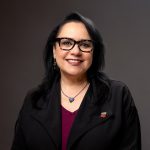
Executive Director of the American Indian Policy Institute & Research Professor, ASU Law
As a member of the Chickasaw Nation of Oklahoma, Traci Morris is a leading scholar on the subject of Tribal Digital Sovereignty, a term coined by Morris. Morris is an expert in tribal broadband and access and testified at the Federal Communications Commission and Capitol Hill.
Since 2014, Morris has been the executive director of the American Indian Policy (AIPI) Institute and is a research professor at the Sandra Day O’Connor College of Law. Under her guidance, the AIPI has expanded its services to Indian Country, collaborating with prominent organizations such as the National Congress of American Indians, and more. She currently serves on the Arizona Governor’s Office Interagency and Community Broadband Advisory Council.
Morris has worked with Native American nations, Tribal businesses, and non-profits. Her research and publications have focused on Internet use, digital inclusion, network neutrality, digital equity, and the development of broadband networks in Indian Country.

Director, Microsoft Cloud and AI Platforms – Tribal Nations
Mac Quig is Director of Cloud and AI Platforms at Microsoft, where he leads the design and deployment of Azure Intelligent Cloud solutions for Tribal Nations and Native organizations. With over six years at Microsoft, Mac brings deep expertise in cloud computing, virtualization, and client engagement, all grounded in a mission-first approach. His work focuses on empowering Indigenous communities through scalable, secure, and culturally responsive technologies that support digital sovereignty and long-term transformation. Passionate about bridging innovation and community priorities, Mac continues to build partnerships that honor Tribal values and drive impactful change.
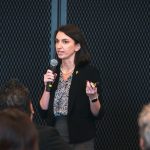
Executive Director, AI Acceleration, Enterprise Technology, ASU
Dr. Elizabeth Reilley is the Executive Director, AI Acceleration, with Enterprise Technology at Arizona State University. Previously at ASU, she worked in the area of Data and Analysis also within Enterprise Technology. Elizabeth has 15 years of experience in higher education working in Academic Affairs, Information Technology, and Strategy and Policy. She has a PhD in Educational Research, Measurement and Evaluation and an MBA from the University of North Carolina at Greensboro and a BA in Philosophy and Community and Justice Studies from Guilford College.

Assistant Dean of Institutional Progress & Executive Director of Indian Legal Program, ASU Law
Rosier is the Assistant Dean of Institutional Progress and the Executive Director of Indian Legal Program (ILP) at the Sandra Day O’Connor College of Law at Arizona State University. She is an enrolled member of the Comanche Nation of Oklahoma. In this role Rosier leads the ILP’s recruitment and retention efforts and is in charge of the ILP’s development and grant work. Rosier served as Director of the ILP from 2000-2011 and returned as Executive Director in 2014. During her three-year absence from the ILP Rosier served as an Assistant General Counsel for the Fort McDowell Yavapai Nation. Prior to joining ASU, she worked as a tribal prosecutor for the Gila River Indian Community. Rosier received her J.D. from the University of Utah in 1998 and a BA from Capital University in 1993.

Attorney, Jenner & Block LLP
Grace Signorelli-Cassady is a member of Jenner & Block LLP’s Native American Law Practice, where she leans on her experience in high-stakes litigation, sensitive investigations, and as a former federal law clerk to deliver significant victories for tribal clients. She secured an over $100 million trial victory on behalf of a federally recognized Indian tribe in an oil lease dispute, successfully defended that win throughout a legal challenge, and then added another $10 million victory in a related dispute. Beyond litigation, Grace has also worked on a variety of tribal energy matters, including guiding a tribe’s pursuit of energy sovereignty and independence and advising on lease and rights-of-way negotiations. Prior to joining Jenner & Block, Grace served as a federal law clerk to the Honorable Roslyn O. Silver of the US District Court for the District of Arizona.
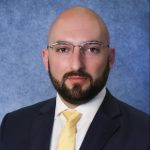
In-House Counsel, Morongo Band of Mission Indians
Max Spivak serves as In-House Counsel for the Morongo Band of Mission Indians, a federally recognized Tribe. Max’s work for Morongo’s community, government, and enterprise stakeholders spans several practice areas for the ultimate purpose of protecting and advancing Tribal sovereignty.

Chief Information Officer, Cherokee Nation
Paula Starr serves as Chief Information Officer for the Cherokee Nation, where she leads technology service delivery rooted in Cherokee values and driven by innovation. With a proven track record in IT leadership and strategic planning, Paula has guided award-winning initiatives—including recognition with the CIO 100 Award—that enhance citizen services and build sustainable, tech-forward futures for the Cherokee community. Her work bridges tradition and transformation, empowering Tribal sovereignty through digital excellence.

AI & Cloud Security Services Practice Leader, Google Public Sector
Jon is a proud citizen of the Cherokee Nation and Practice Leader for AI & Cloud Security Services at Google Public Sector, where he brings over 20 years of consulting experience in the cybersecurity and information technology arena helping government agencies defend against modern threats. During his time at GPS Jon has helped many government agencies improve their security postures, while also leading the post breach transformation efforts of some national headline security incidents.
Prior to helping government customers at Google, Jon was an Azure security architect at a Magic Quadrant leading software supply chain firm. Jon has also spent time in local government space in the North Texas area, in one case leading the incident response to restore public services after a ransomware attack.

Vice President Information Technology, Casino-Information Technology, Sycuan
Patrick Tinklenberg is the Vice President of Information Technology with Sycuan Casino where, for the last 10 years, he has been responsible for technology, strategy, and information security for the casino, hotel, and golf resort. Previously to his role with Sycuan, Patrick was the IT Director for the Barona Band of Mission Indians where he ran the IT operations at all tribal government service facilities, government-supported enterprises, and the Barona Gaming Commission. Patrick is also an active participant in the tribal technology community as a board member on both the TribalNet Gaming & Hospitality Board and the Tribal-ISAC Steering Committee.
Senior Research Fellow, Tribal Water Policy, Kyl Center for Water Policy, ASU
Cora Tso is an enrolled member of the Navajo Nation. She is of the Reed People clan and born for the Black Streaked Wood clan. Her maternal grandparents are of the Bitterwater clan and her paternal grandparents are of the Red House clan. She was born and raised on the Navajo reservation and is originally from Shonto, Arizona, located in northeastern Arizona. Cora currently works at Arizona State University (ASU)’s Kyl Center for Water Policy at Morrison Institute as a Senior Research Fellow. In this role, Cora develops research and policy analysis for Arizona Tribal water policy in collaboration with various water stakeholders in Arizona and the Colorado River Basin in connection with the Arizona Water Innovation Initiative (AWII). Previously, Cora has worked with governmental, private and non-profit organizations focusing on Indian law, water law and environmental law and policy matters. She holds a Bachelor of Science in Political Science, a minor in American Indian Studies and a Juris Doctor degree from Arizona State University. She is passionate about using her education and profession to secure and protect Tribal rights to lands and waters in the Southwest.
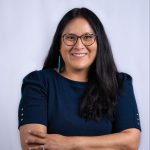
Assistant professor, School of Life Science, ASU
Krystal Tsosie (Diné/Navajo Nation), PhD, MPH, MA, is an Indigenous geneticist-bioethicist and Assistant Professor in the School of Life Sciences at Arizona State University. As an advocate for Indigenous genomic data sovereignty, she co-founded the first US Indigenous-led biobank, a 501c3 nonprofit research institution called the Native BioData Consortium.
Her research can be encapsulated in two main foci: Indigenous population genetics and bioethics. In particular, she focuses on bioethical engagement of Indigenous communities in genomics and data science to build trust. As a whole, her interest is in integrating genomic and data approaches to assess Indigenous variation contributing to health inequities.
She began her research career at the laboratory bench, where she developed and patented a combined targeted ultrasound imaging and chemotherapeutic drug delivery device for treating early metastases in cancer. Upon seeing the disparities in emerging genomics technologies, she switched fields to genetic epidemiology, public health, and bioethics. Her first Master of Arts in Bioethics at Arizona State University focused on the cultural implications of genetics in Native American communities. She added biostatistical knowledge and computational programming in large genomics datasets during her second Master’s in Public Health (genetic epidemiology) at Vanderbilt University, where she studied disparities in uterine fibroids in African American women. She has co-led an ongoing longitudinal genetics study in a North Dakota Tribal community. This project serves as one of few examples of community-based participatory research involving genetics in an Indigenous tribal nation.
Her research and educational endeavors have received increasing national and international media attention as scientists worldwide are understanding the importance of equitable, community-based engagement models and the importance of Indigenous genomic data sovereignty. Her work has been covered by popular media outlets including PBS NOVA, The Washington Post, NPR, New York Times, The Atlantic, Forbes, and Boston Globe. She currently serves on the Government Policy and Advocacy Committee for the American Society of Human Genetics and two National Academy of Medicine Committees on Emerging Science, Technology, and Innovation and Engaging Scientists in Central Asia on Data Governance. She is a current Global Chair in ENRICH (Equity for Indigenous Research and Innovation Coordinating Hub), which focuses on enhancing Indigenous rights to develop, control, and govern Indigenous data and supports participation in STEM and in digitally‐enabled futures.

Director, Great Lakes Indigenous Law Center, UWLS
Amanda L. White Eagle is the Great Lakes Indigenous Law Center Director and Assistant Teaching Professor at University of Wisconsin Law School. Before joining UW Law School, White Eagle was the NYU-Yale American Indian Sovereignty Project Clinical Fellow.
With nearly 20 years of tribal law experience, she has provided advice and counsel to the Ho-Chunk Nation government. She previously served as a judicial officer (an interim chief judge and associate judge), as well as the tribe’s Attorney General and Executive Director for the Ho-Chunk Nation Department of Justice. Additionally, she serves as a tribal court judge or justice to tribal governments throughout the United States, including the Wampanoag Judiciary, Prairie Island Indian Community Court of Appeals, Santee Sioux Nation Judiciary and Turtle Mountain Band of Chippewa Indians.
She received her J.D. from University of Wisconsin Law School and graduated from the University of Wisconsin-Madison with liberal arts degrees (a B.A. in Anthropology and French and a Certificate in American Indian Studies).

Professor of Practice, ASU Law
Tyson Winarski is an Intellectual Property Law Professor and Patent Attorney with the Sandra Day O’Connor College of Law with Arizona State University. Tyson is also a technologist (BSME, MSEE) and inventor with over 52 patents in Artificial Intelligence (AI), blockchain, renewable energy, graphene optic fibers, nanotechnology, and social networking devices. Various technology companies have purchased or taken a license to Tyson’s patents. Tyson has also co-founded H2Gr0, an AI software start-up company focusing on sustainable fertilizer management for agriculture. At ASU, Tyson teaches courses on Strategic Protection of Artificial Intelligence and Emerging Technologies with Intellectual Property, Patent Law, Patent Licensing and Monetization, IP Licensing, and Appeals to the USPTO Patent Trial and Appeals Board. Tyson is also adjunct faculty on IP Law at the University of San Francisco School of Law.
Tyson serves on the Board of Directors for the Western National Parks Association, non-profit partner of the National Park Service. Tyson also served on the board of directors for the Grand Canyon Conservancy for six years, the official nonprofit partner of the Grand Canyon National Park.



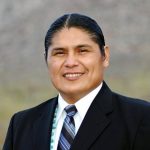 Chris Deschene
Chris Deschene Morgan Gray
Morgan Gray Krystalyn Kinsel
Krystalyn Kinsel Stacy Leeds
Stacy Leeds